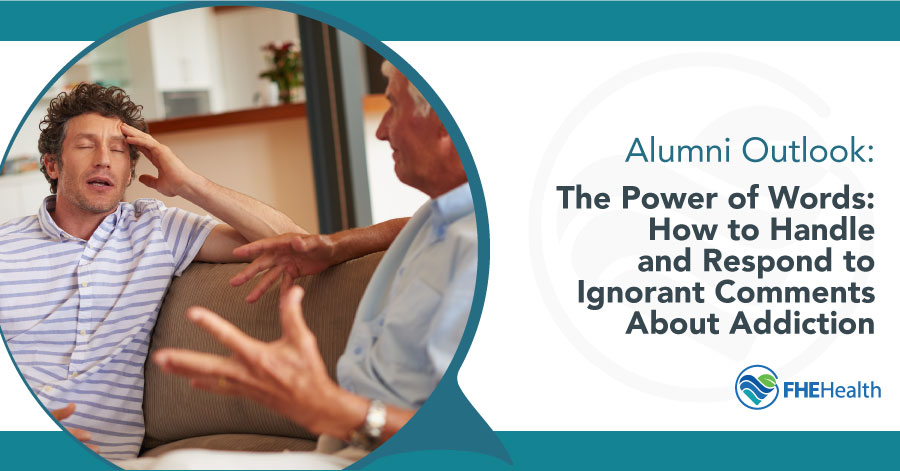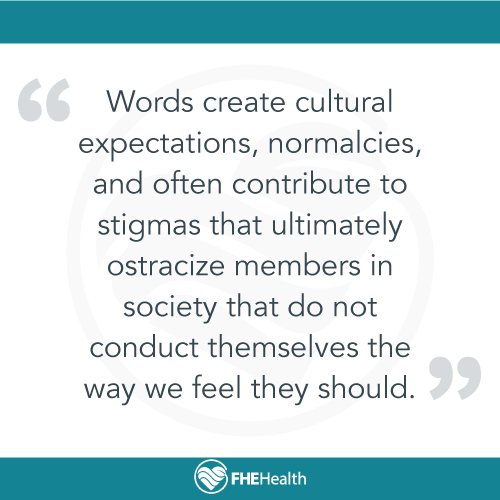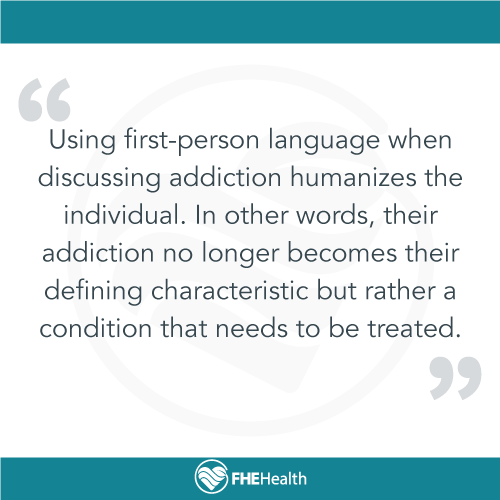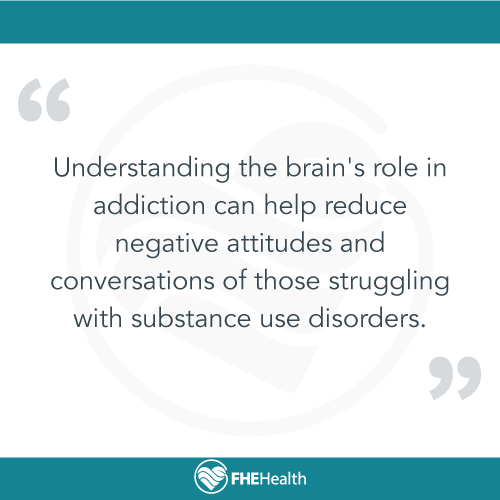
Words have the power to make or break us. Kind words can make us feel on top of the world, while hurtful words can destroy our self-esteem and take us down a dark path. Words have the power to shift our perception of the world. As a content writer, I understand the importance of the language I use. The words we use can inflect the emotions we are feeling and represent how we think about other people or situations. Language has the incredible power to shape our identities for the better; but, can also be harmful. Words create cultural expectations, normalcies, and often contribute to stigmas that ultimately ostracize members in society that do not conduct themselves the way we feel they should.
Throughout history, we have seen how words have been used to cultivate racism, cultural diversity, shame, and prejudice across our nation. This has been especially true for the addiction and recovery community. While much advocacy and scientific research have created healthy conversations surrounding substance abuse disorder, there are still stigmas surrounding the topic. As the number of fatalities associated with the opioid epidemic continues to rise, so have the media’s headlines covering addiction and recovery. Many of these headlines have sparked conversations throughout communities across the nation. While our words can be used to express love and support, they can also contribute to the stigma of addiction and even cause pain. Here are some of the ignorant conversations surrounding addiction and how you can deal with them when they arise.
“Addicts,” “Alcoholics” & “Junkies”
 What is the first thing that comes to your mind when you hear these terms? Before experiencing addiction myself, I imagined some unfortunate human begging for change at my local underpass or significant intersection. Some people may think of a troubled celebrity that was recently busted for a DUI in the news. Other people may think of a cousin who has wreaked havoc on the family system and can’t seem to hold it together.
What is the first thing that comes to your mind when you hear these terms? Before experiencing addiction myself, I imagined some unfortunate human begging for change at my local underpass or significant intersection. Some people may think of a troubled celebrity that was recently busted for a DUI in the news. Other people may think of a cousin who has wreaked havoc on the family system and can’t seem to hold it together.
The truth is, addiction is a vicious disease and it does not discriminate. While many of these stigmas have been created due to the experiences others have shared while dealing with individuals struggling with addiction, it makes the conversation a very difficult one. Facing the language behind addiction can be extremely difficult for those of us in recovery or attempting to seek help. This specific type of language has perpetuated stigma and ultimately cultivated shame for the individuals struggling with this disease. This type of language often propels the fear of our own negative thinking.
Research also shows that using terms such as “abuse” and “abuser” negatively affects perceptions and judgments surrounding people struggling with addiction. The weight of the words used when discussing addiction carries a stigma and can ultimately harm the individuals who desperately need help.
Using First-Person Language
 The words we use when talking about other people often speaks volumes to how we think or even judge them. Certain words can often place a person into a box that cultivates judgments and discrimination. In 2018, The Associated Press took action on destigmatizing addiction by removing the word “addict” as a noun. Furthermore, the AP took it a step further by encouraging phrases such as “they were addicted” or “people with addictions.”
The words we use when talking about other people often speaks volumes to how we think or even judge them. Certain words can often place a person into a box that cultivates judgments and discrimination. In 2018, The Associated Press took action on destigmatizing addiction by removing the word “addict” as a noun. Furthermore, the AP took it a step further by encouraging phrases such as “they were addicted” or “people with addictions.”
Using first-person language when discussing addiction humanizes the individual. In other words, their addiction no longer becomes their defining characteristic but rather a condition that needs to be treated. For example, if a person has the disease of cancer, we do not refer to them as a cancer. Many professionals have suggested that we use words that do not hold the weight of judgment but rather use first-person language such as an “individual with substance use disorder.” The goal is to rid of stigmatizing terms such as “addict” or “junkie.”
“Addiction is Not a Disease.”
This phrase is probably one of the most overused and incorrect statements I’ve heard all throughout my sobriety. Many individuals who are uneducated on addiction refer to this phrase as a way to discriminate and shame those of us struggling with addiction or in recovery. Many individuals do not believe addiction is a disease because it is caused by a person’s choice to use substances. While the first use (or early-stage use) is made by choice, once the brain has been altered by addiction, many experts and research have proven that chemicals within the brain are changed. The person then loses control of their obsessive-compulsive behavior.
Choice is not a determining factor on whether or not something is a disease. For example, heart disease, diabetes, and even certain forms of cancer can involve an individual’s personal choices like diet, exercise, sun exposure, etc. A disease is what happens in the body of an individual as a result of these choices. According to a recent article, drugs hijack dopamine pathways, teaching the brain that drugs are good, therefore reinforcing the individual’s desire to use more and more of the substance. Understanding the brain’s role in addiction can help reduce negative attitudes and conversations of those struggling with substance use disorders. Addressing drug use as a disease to be treated, and not a problem to be shunned can dramatically reduce the harm caused by drug addiction.
Changing the Conversation Surrounding Addiction
 While it can be extremely tempting to lash out in anger or even to contribute to the stigma by referring to yourself as a “junkie” – stigma kills. When people who need help treating a condition, whether it is substance abuse or mental illness, feel they are judged or discriminated they may feel there is no help or hope for them. Physical conditions such as cancer and even broken bones are not stigmatized, and patients can freely seek treatment without judgment. Individuals seeking help for their alcoholism or addiction often do not feel as safe when seeking the resources, they need to recover. For example, quality of care is a significant reason why we should change our language regarding substance abuse. Medical professionals, addiction treatment counselors, and mental health clinicians work tirelessly to address their own biases to ensure they provide quality care for every patient.
While it can be extremely tempting to lash out in anger or even to contribute to the stigma by referring to yourself as a “junkie” – stigma kills. When people who need help treating a condition, whether it is substance abuse or mental illness, feel they are judged or discriminated they may feel there is no help or hope for them. Physical conditions such as cancer and even broken bones are not stigmatized, and patients can freely seek treatment without judgment. Individuals seeking help for their alcoholism or addiction often do not feel as safe when seeking the resources, they need to recover. For example, quality of care is a significant reason why we should change our language regarding substance abuse. Medical professionals, addiction treatment counselors, and mental health clinicians work tirelessly to address their own biases to ensure they provide quality care for every patient.
By changing how we discuss and address the way society talks about addiction, we can shed light on the dangers of the stigma associated with this disease. It is essential to not only change our language regarding these matters but also to educate people who may not know about the true nature of substance use disorder. No one grows up thinking: I wanna be an addict when I grow up and ruin my life and the lives of everyone around me. Addiction is not a choice and relapse is not a failure. We must treat everyone equally – even if they are struggling with addiction. Together, we can change the conversations that predetermine an individual to be morally wrong by educating others on how these individuals are sick. We are now aware that the exposure to these types of words create a bias and prevent proper healthcare from being carried out. To properly address the ignorant conversations surrounding addiction, we must create a unified language and reflect the evidence provided by science.






